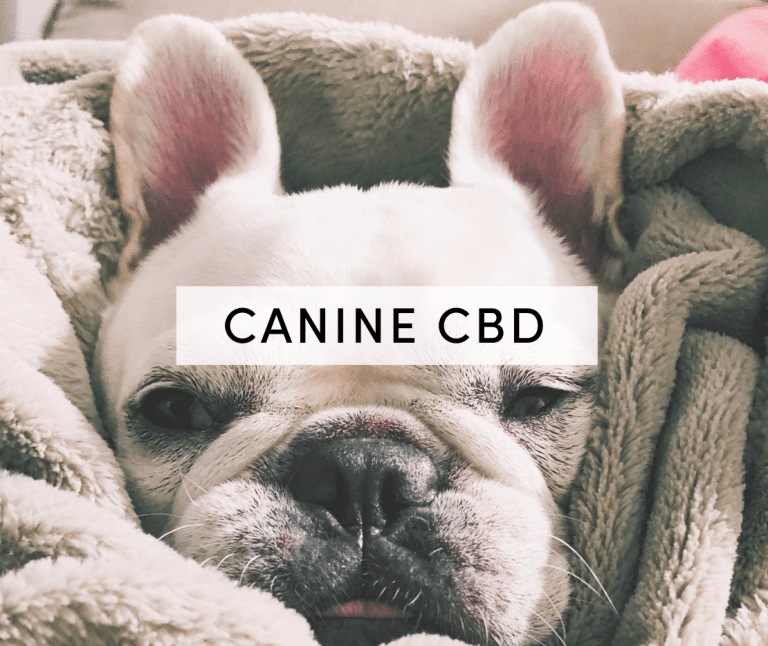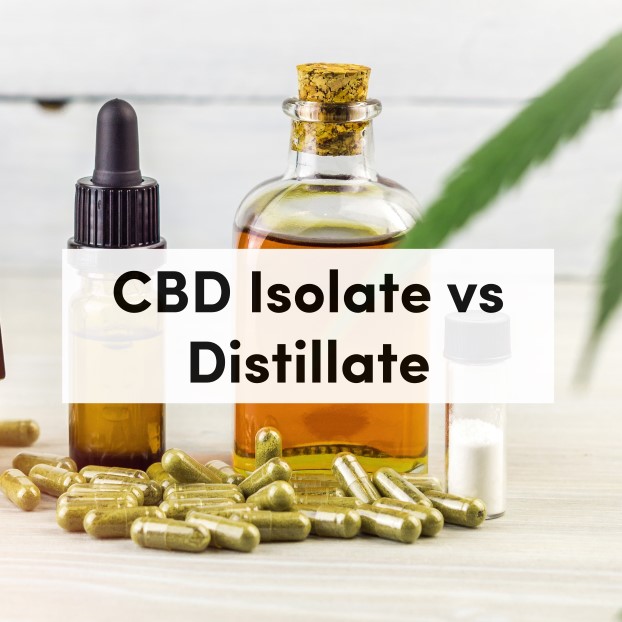Canine CBD: Will Cannabidiol Work for Your Four Legged Friend?

Posted on March 31st, 2021
Over the last few years, there has been a significant increase in the popularity of CBD products. There are a number of reasons for this increase. The 2018 Farm Bill legalized hemp production, allowing hemp to be cultivated, sold, and distributed. Beyond that, there have been many studies and discoveries about the health benefits of CBD. While CBD products are primarily for human use, there are also products on the market that are meant for animals. Below, you’ll find more information about canine CBD, how it works, and how to use it safely.
What Is CBD?
Cannabidiol (CBD for short) is a phytocannabinoid. Phytocannabinoids are a type of cannabinoid that exist naturally in plants. CBD is one of over a hundred cannabinoids that we know come from cannabis.
Although CBD does come from cannabis plants, it doesn’t cause the same sort of high that you can get from marijuana. This is because most CBD products come from hemp plants instead of marijuana. Hemp plants do not contain significant amounts of THC.
Many people praise cannabidiol for its health benefits. People use it to treat a number of conditions including anxiety, pain, and insomnia. Researchers are still studying CBD to learn more about the medical potential it may have. Canine CBD is an area that could certainly use more research.
CBD products come in many forms including ingestible tinctures, capsules, and topical creams. In the United States, it is federally legal to purchase CBD products in all 50 states. The one stipulation is that the product contains less than 0.3% THC.
 Where Does CBD Come From?
Where Does CBD Come From?
The highest concentrations of CBD are in hemp, a cannabis plant that closely resembles marijuana. To make the many CBD product options, manufacturers must first extract the cannabinoid from the plant. They can then isolate as much or little of the pure compound as they wish.
There are a number of ways to extract CBD from hemp plants. One of the most common extraction methods is the solvent extraction method. This uses substances like butane, ethanol, or propane to extract CBD from hemp plants. Another common extraction method is the carbon dioxide extraction method, which uses CO2 gas to strip CBD from plants. The latter is a bit cleaner, but more expensive to accomplish.
After extraction, some products undergo a purification process to remove other substances from the plant. Quality of CBD products can vary, which is why it is always important to closely look at the concentration of CBD and the ingredients list before purchasing products.
How Does CBD Work?
The human body has a biological network called the endocannabinoid system (ECS). The system influences many processes, including sleep, appetite, and mood. There are three main components within that system: enzymes, receptors, and cannabinoids. Interestingly, many animals also have endocannabinoid systems. Dogs do have them, which is why canine CBD is effective.
Certain enzymes can break down endocannabinoids. Endocannabinoids are able to interact with and bind to receptors throughout the body. While this is something that the body does naturally, CBD is also able to influence endocannabinoid receptors. This means it can have a direct impact on processes in the body.
While there are many different cannabinoid receptors in the body, CB1 and CB2 are the ones we know best. CB1 receptors are primarily present within the nervous system and help to regulate brain functions properly. On the other hand, CB2 receptors are primarily present n immune cells.
CBD is able to interact with both CB1 and CB2 receptors. It also has interactions with other pathways within the body. Experts believe that CBD is also able to prevent the body from breaking down certain chemicals like serotonin. Researchers are still learning more about CBD and how it interacts with the ECS.
Canine CBD
CBD is intended for humans, but it can be effective on dogs as well. In fact, there are many CBD products on the market that are specifically designed for dogs. These products contain additional components that are beneficial to pets. It’s also common for these products to use flavorings that dogs will enjoy. For example, there are pet CBD products that mimic the flavor of meat.
How Does Canine CBD Work?
Like humans, dogs have an endocannabinoid system. This system helps to regulate appetite, mood, body temperature, sleep, and pain perception. When a dog does not have enough endocannabinoids, it can cause behavioral issues, indigestion, anxiety, aggression, and lethargy.
At the time of writing, there have not been any formal studies that have looked at the full details CBD can have on dogs. However, experts do know that the ECS in dogs functions similarly to humans. Canine CBD is able to interact with canine CB1 and CB2 receptors.
The Effects Of Canine CBD
Based on what we know, canine CBD should improve function of the canine ECS. This means that CBD could help dog owners to manage a number of their pets’ issues. Various health conditions, anxiety, nausea, and lack of appetite may all benefit from canine CBD. Canine CBD also shares the same metabolic pathways as some anti-inflammatory medications. This means it could ease pain and manage swelling.
In one study, researchers used CBD to treat dogs that were suffering from osteoarthritis. 80% of the dogs in the study showed significant improvements in mobility and reduction in physical pain. Dogs that participated in the study showed no observable side effects.
In another study, epileptic dogs were given CBD along with seizure medication. Other dogs in the study continued to take their medication, but were given a placebo in place of CBD. The dogs that took CBD experienced a noticeable reduction in seizures.
Experts are still learning more about how CBD impacts both humans and dogs. However, early evidence suggests that it can have a number of positive effects. When giving CBD to a dog, you should monitor it closely.
Proper Dosage for Canine CBD
While canine CBD is safe, it is still important to use the right dosage. Smaller dogs will need a lower dosage, while larger dogs will need a higher dosage. Dog owners must also consider the potency of the product when deciding on a dosage for their dog. If a product has a high concentration of CBD, a low dosage may be sufficient for large dogs.
Currently, the recommendation from experts is to give dogs approximately 2 mg of CBD per kg of weight. When introducing CBD to a dog, however, it is best to give them a very low dose. It’s important to monitor how the dog responds to the product before increasing the dose.
In most cases, canine CBD products will come with dosing recommendations. These recommendations can be a useful guideline, but it is still best to use caution when introducing a dog to CBD. Since the FDA does not officially regulate CBD, products can vary significantly.
 Can Canine CBD Get Your Dog High?
Can Canine CBD Get Your Dog High?
Products that are made for dogs should not contain more than trace amounts of THC. Because of this, CBD will not cause a high in pets. Many consider THC to be harmful to dogs, so avoid products that do contain larger amounts.
Although canine CBD does not have psychotropic properties, it can cause changes in behavior. CBD can cause dry mouth, which means dogs may be extremely thirsty after consuming it. CBD may also cause some dogs to feel drowsy or lethargic. These side effects are more likely to occur at higher doses.
It’s important to keep in mind that CBD products can impact different dogs in different ways. The American Kennel Club recommends buying liquid CBD products so that it is easier to control dosage. Even though canine CBD should not contain THC, dogs may experience adverse effects if the dosage is too high.
Should You Consult A Vet First?
Yes, you should always consult a vet before giving your dog CBD. While state laws may restrict what vets can say to clients about CBD products, it is important to check in with your dog’s vet before introducing your pet to any new supplement.
A veterinarian will be able to point out if there is a potential conflict between CBD products and the prescription medications that a dog is currently taking. Vets also have access to the most current information about canine CBD. Vets may be able to offer guidance and additional information.
Since vets provide animals with crucial medical care, it’s important to keep them in the loop about changes in a dog’s health. Vets should know about the products the dog is using and the dosage the dog is receiving.
Canine CBD can be highly beneficial, but it’s important to keep in mind that the substance is still undergoing necessary research. Always use caution when administering CBD to a pet. Only use products that are meant for pets. If you administer it carefully, CBD can be a highly therapeutic substance for both dogs and humans alike.






